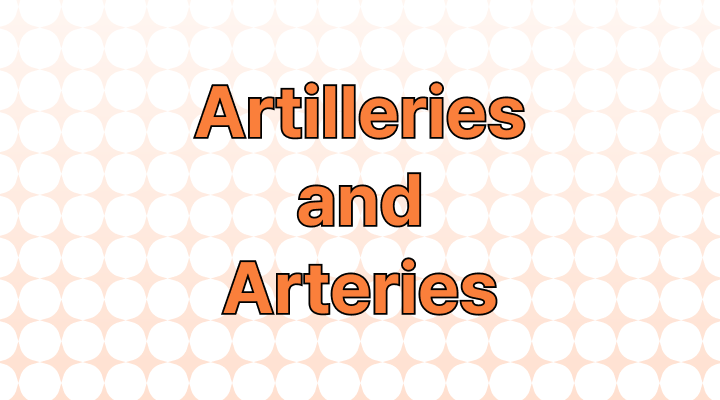Artilleries are military weapons that discharge missiles or bullets or a military branch that employs large-caliber guns, while arteries are tube-like vessels that carry oxygenated blood from the heart to other parts of the body.
Although the spelling of the two words may look similar at first glance, they are two distinct terms with completely different meanings.
Artilleries can encompass hand-carried firearms or large guns that are moved on wheels or metal tracks. The latter refers to cannon-like guns that launch larger missiles that do substantial damage. These high-caliber weapons are used in warfare, although there are ways for normal US citizens can have access to some of these destructive arms under certain conditions.
Arteries is a common term in biology and the medical field. The walls of these vessels are lined with muscles that help push the blood from the heart to other parts of the body. Arteries are not to be confused with veins, which pump blood from other parts of the body back to the heart.
Example sentences
Artilleries
- The battlefield echoed with the deafening sounds of firing artilleries.
- The cavalry charged while the artilleries provided supporting fire from behind.
- The fortifications were equipped with advanced artilleries capable of long-range attacks.
- The historical reenactment showcased the use of authentic Civil War-era artilleries.
- The battlefield terrain proved challenging for maneuvering heavy artilleries.
- The enemy's air defenses were no match for our precision-guided artilleries.
- The field artillery unit practiced firing live rounds to hone their skills.
- The trench warfare heavily relied on the deployment of mobile artilleries.
- The museum displayed an impressive collection of antique artilleries from various periods.
- The artillery crews demonstrated their efficiency in loading and firing the cannons.
Arteries
- The circulatory system consists of veins and arteries that transport blood throughout the body.
- A healthy lifestyle is essential for maintaining clear and functioning arteries.
- The doctor conducted an angiogram to assess the conditions of the patient's coronary arteries.
- Blockages in the arteries can lead to reduced blood flow and potential health risks.
- Cardiovascular exercise helps improve the health and flexibility of the arteries.
- High cholesterol levels can contribute to the narrowing of arteries and potential heart problems.
- The surgeon performed a bypass surgery to reroute blood flow around the blocked arteries.
- The patient's blood pressure was elevated due to constricted arteries.
- The cyclist's strong cardiovascular system allowed efficient blood flow through his arteries.
- The doctor explained that smoking can damage the lining of arteries and increase the risk of heart disease.
Want to sound like a native speaker?
Engram’s AI-powered grammar checker makes your English sound like a native speaker’s, suggesting natural English expressions on top of fixing grammar, spelling, punctuation, word order, and vocabulary.

Reference:

















